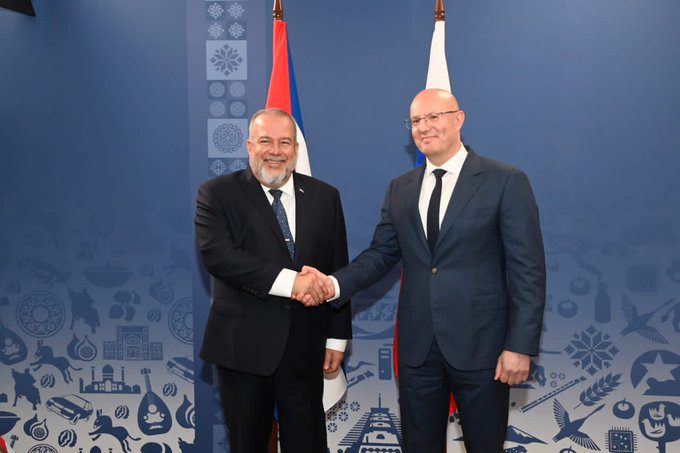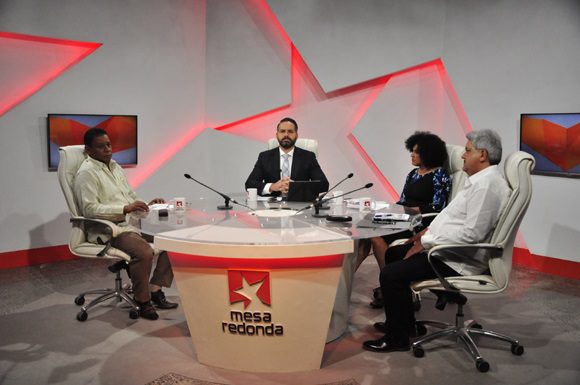12th June 2023
Russia’s Prime Minister, Mijaíl Mishustin, has described Cuba as Moscow’s key partner in Latin America. Speaking at the start of an eleven-day official visit by Cuba’s Prime Minister, Manuel Marrero, and an accompanying high level Ministerial delegation, Mishustin said that relations were moving to a new level.
“For us it is very important to relaunch our cooperation to increase trade and investment. We are creating the conditions to expand the operation of Russian companies in the Cuban market. We propose to develop more actively collaboration in the tourism field after the resumption of regular flights with Cuba, starting on 1 July, “ he said.
Mishustin also stressed that Russia attached “great importance to the implementation of large joint projects, especially those designed for the long term, such as the modernisation of the José Martí Steel Company (Antillana de Acero).”
More details as to the nature of future Russian cooperation are expected in the coming days when Marrero attends and speaks at the St Petersburg International Economic Forum. However, Cuban official reporting on remarks made by Cuba’s Prime Minister and senior Russian ministers at the third Eurasian Economic Union (EAEU) Intergovernmental Council outline the significant deepening envisaged in the future economic relationship.
Reporting on remarks made by Russian Vice Prime Minister, Dmitri Chernyshenko, during the first day of the EAEU meeting, Prensa Latina confirmed that progress is being made on the development of an outline Russian commercial, economic, scientific, and technical cooperation programme with Cuba to cover the period 2023-2030.
It quoted Chernyshenko as saying that following his visit to Havana in late May “Russia has reviewed the document in detail, and it is now being examined by Cuba. There will be an agreement on preferences for business in our countries, an integral part of which will be a roadmap for the application of preferences and a project plan up to 2030.” “We hope that at the St Petersburg International Economic Forum we can be ready to give more details,” Chernyshenko added.
The official Cuban news agency added that when Russia’s Deputy Prime Minister was in Havana, “outside the intergovernmental commission, a memorandum on Russian investment projects in Cuba, a road map for the application of preferential measures and an updated programme of commercial, economic, scientific and technical cooperation for 2023-2030 were signed.” (Background Cuba Briefing 22 May 2023)
New Russian economic relationship ‘a model for Eurasia’
Speaking in Sochi to the EAEU’s Intergovernmental Council meeting which was attended by President Putin and other government leaders from member states of the Eurasian grouping, Marrero stressed the importance of developing closer economic cooperation at a time of international tension and sanctions.
In doing so, he said that advances in relation to “mutually advantageous projects between Havana and Moscow” could serve as a reference for economic and commercial relations between Cuba and the countries of the EAEU. “In these difficult times where some countries impose unilateral sanctions on others, this Union is extremely important because there is strength in unity. Cuba will not let [EAEU members] down as an observer state,” he said.
Marrero indicated during the Council’s closing session that the areas of economic collaboration sought by Cuba with EAEU states were in the scientific-technical field, finance, transport and logistics infrastructure, computerisation and digital transformation, tourism, and industrial development. He also stressed the potential for trade and the role Cuba might play with EAEU member states in relation to Latin American and Caribbean markets based on its geographic location and its existing trade agreements.
“The existence of partial scope agreements and economic complementation for the reduction of tariffs signed by Cuba with countries of our region, constitute an additional advantage to achieve the objectives [providing] bonuses for all parties,” he said. He also reiterated Cuba’s interest in establishing a related industrial park for the exclusive participation of the EAEU in the Mariel Special Development Zone.
The EAEU consist of Armenia, Belarus, Kazakhstan, Kyrgyzstan, and Russia, with as observers
Cuba, Moldova, and Uzbekistan.
Marrero’s visit to Russia continues
Marrero’s programme continues at press time and is expected to include, according to the Russian media, further high-level meetings with senior Russian Ministers and business leaders and attendance at the St Petersburg Economic Forum. He is accompanied by among others, Vice Prime Minister Ricardo Cabrisas, the Minister of Foreign Trade and Foreign Investment, the Ministers of Public Health, Tourism, Energy and Mines, and Transportation, the Minister-President of Cuba’s central bank, and the First Deputy Minister of Foreign Relations.
The Russian government linked media platform Sputnik noted that among the issues being discussed during the visit are how to make bilateral cooperation more beneficial beyond trade in goods and tourism.
It noted that discussions were underway about possible joint scientific cooperation in the application of genetic technology to pharmacy, medicine, and agriculture; interaction in the field of biomedicine and biopharmaceuticals, in which it noted “Cuba traditionally occupies leadership positions”; and the development of new varieties of agricultural plants and complex technologies to improve Cuban agriculture.
At the time of the Russian-Cuban Intergovernmental Commission on Trade, Economic, Scientific, and Technological Cooperation the Russian news agency Interfax reported that trade between Russia and Cuba is growing rapidly. It quoted Russian Deputy Prime Minister, Dmitry Chernyshenko, as saying that bilateral trade trebled threefold in 2022 to US$452mn.
“In 2022, [Russia-Cuba] trade grew threefold to US$452mn, and in the four months of 2023, it soared ninefold to US$137.6mn year-on-year,” Chernyshenko said when opening the May meeting. However, Interfax also quoted the Commercial Counsellor of the Russian Embassy in Cuba, Serguei Baldin, as saying that 90% of Russia’s trade with Cuba comprised of sales of petroleum products and soya oil, while Russia mainly imported rums, coffee, and cigars. Official Cuban statistics suggest that the level of bilateral trade is lower in terms of value than noted by Chernyshenko.
According to Oleg Savchenko, Deputy Chair of the State Duma Committee on Financial Markets, Cuba is the first stop for the Kremlin in developing an extensive network of bank branches in Latin America to offset Western sanctions introduced following Russia’s invasion of Ukraine.
“We are potentially interested in Argentina, Brazil, Paraguay, Bolivia, Uruguay, Venezuela and others. These states are looking for links with Russia, given that we are world leaders in food, including grain exports,” Savchenko told the Russian publication Paragraph. If Russia’s financial institutions can break into these markets, and the Bank of Russia supports them in this, he told the publication, “then we will see a fundamentally different result.”
The Caribbean Council is able to provide further detail about all of the stories in Cuba Briefing. If you would like a more detailed insight into any of the content of today’s issue, please get in touch.
Photo via havanatimes.org













